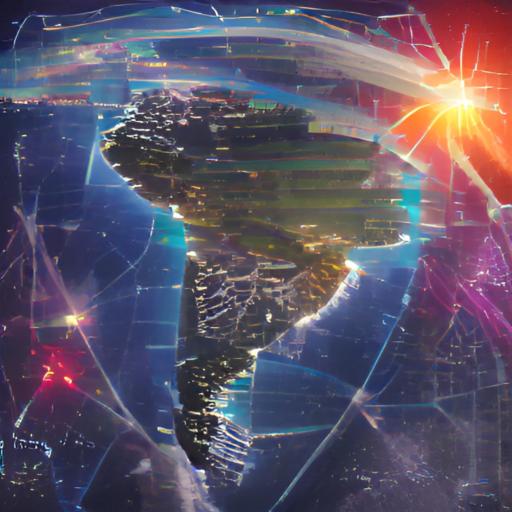Argentina has a legacy of cryptocurrency adoption, and it’s no mystery why. Cryptocurrencies aren’t adopted because everything is perfect but because things are falling apart—when trust in government and currency erodes, people start looking for alternatives. It’s similar to early 20th-century Europe, where political systems were reimagined as people moved away from traditional governance structures.
Today, we’re at another global inflection point. The effects of globalization have led to a growing divide—those who have are thriving, while those without are struggling with inflation and a sense of disillusionment. In the U.S., for instance, older generations often criticize Gen Z for their lack of motivation, but the reality is that things have changed. Decades ago, a high school graduate could afford a home, a car, and a stable life, which is not the case now. Our system is fractured: wages stagnate, trust fades, and there’s a crisis of meaning. We see it everywhere—in the U.S., in Europe, and here in Argentina. That’s why blockchain is so powerful. From a single paper in 2008, the industry has grown into a $2 trillion global network in just 15 years. Blockchain’s core aim is simple but profound: to help us trust one another again. Why does trust matter? Imagine two neighbors. If they trust each other, they can buy and sell land with just a handshake, resolving any issues directly. But without trust, they need lawyers, litigation, and years of hassle. The outcome is the same, but the cost is higher. On a global scale, this lack of trust leads to conflicts and division.
Blockchain aims to restore trust by creating a shared, objective reality. Like engineering—where everyone, no matter where they are, follows the same laws of physics—blockchain can create a universal consensus on events and transactions. This shared reality becomes a foundation on which we can build social, economic, and political systems that everyone can trust. With blockchain, we have the potential to decentralize authority and allow communities worldwide to participate in this shared truth. Places like Argentina, with a spirit for change, are crucial to this movement. Here, people aren’t waiting for laws—they’re already building. Argentina is one of the largest markets for Tether and home to countless blockchain developers. It’s inspiring to see people driven not by profits alone but by a vision for the future.
I’ve been around the world—74 countries in the past decade—and my favorite places are the ones ready for change. Here, people want to explore new organizational models, decentralized governance (DAOs), smart contracts, and alternative economic systems. Argentina is thinking ahead, discussing real human rights and societal challenges, not just profit margins. Why do I keep going? Because places like this keep me young and hopeful. Everywhere I look, there’s cynicism, but when I come to places that welcome new ideas, I believe that the world can get better. In the next 30 years, we will see incredible advances. I’ve even founded a company working on bioluminescent plants, which could eventually help combat climate change. Imagine glowing plants that people want to plant for their beauty but that also help sequester carbon. Blockchain can incentivize such actions by creating value and driving global participation. Every great transformation in history involved collaboration on an unprecedented scale. Just 63 years passed between the Wright brothers’ first flight and the moon landing. That’s the power of collaboration, and blockchain has the potential to coordinate billions of people worldwide. Through decentralized governance and blockchain’s intrinsic incentives, we have a unique chance to solve real-world problems.
Good governance matters. Poor governance leads to broken systems, as we see in struggling states, whereas strong governance creates prosperity and stability, as seen in countries like Switzerland. Cardano has invested in decentralized governance, with workshops in over 50 countries and ongoing initiatives that involve communities globally. This commitment to inclusion and collaboration is setting us up for the best roadmap in the cryptocurrency industry by 2025. Cardano’s focus on decentralization and inclusive governance isn’t just a design choice; it’s a commitment to a world where everyone has a seat at the table. I’m thrilled to announce that our Constitutional Convention will be held here in Argentina this December, with delegates from all over the world drafting a constitution by and for the people.
The principles of Cardano—decentralization, resilience, and a commitment to long-term thinking—are what will allow us to grow, not just in the next few years but over the coming decades. I began Cardano in Japan, inspired by their multi-generational approach. When I spoke to a worker on the Shinkansen, he told me he was following a tradition started by his grandfather, who worked on the same tracks. That dedication to the future inspired me to think of Cardano as a project that will outlast us all. This industry has the potential to be more inclusive, more resilient, and more impactful than any before it. Imagine a world where the technology we rely on is built by the people, for the people—a world where we can finally trust, believe, and create together. That’s why I’m here, and that’s why Argentina is such a special place for Cardano’s future. Thank you for being part of this journey. It’s an honor to be here and to be a part of this global family.



No comments yet…